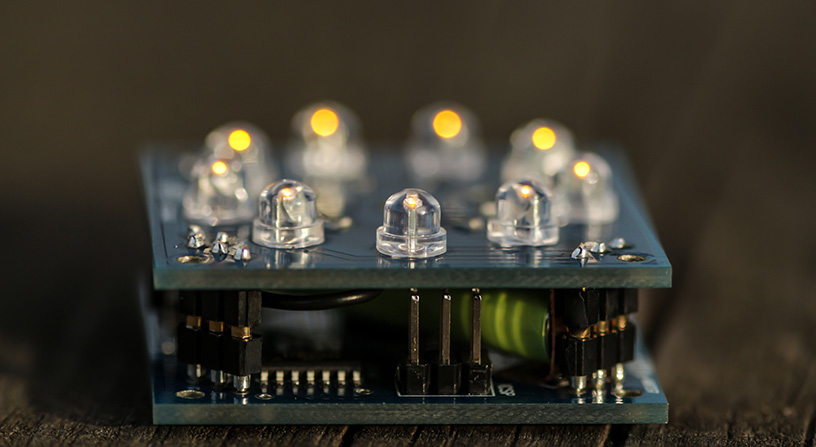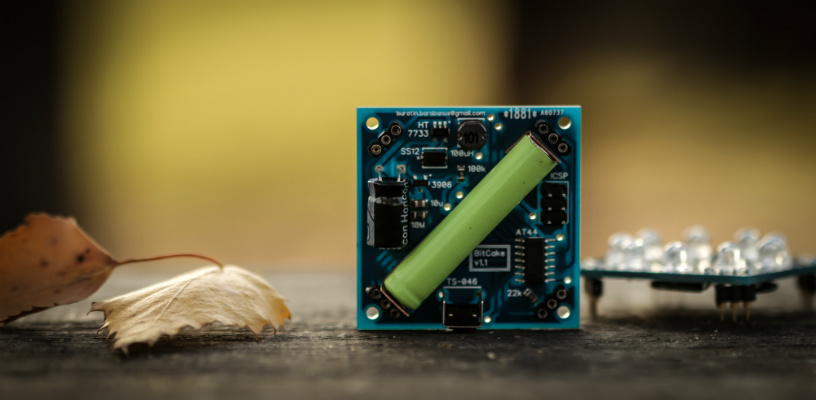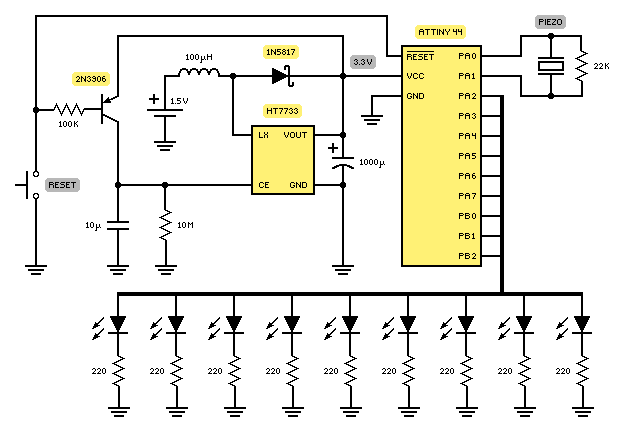- makeITcircular 2024 content launched – Part of Maker Faire Rome 2024Posted 2 weeks ago
- Application For Maker Faire Rome 2024: Deadline June 20thPosted 2 months ago
- Building a 3D Digital Clock with ArduinoPosted 7 months ago
- Creating a controller for Minecraft with realistic body movements using ArduinoPosted 7 months ago
- Snowflake with ArduinoPosted 8 months ago
- Holographic Christmas TreePosted 8 months ago
- Segstick: Build Your Own Self-Balancing Vehicle in Just 2 Days with ArduinoPosted 8 months ago
- ZSWatch: An Open-Source Smartwatch Project Based on the Zephyr Operating SystemPosted 9 months ago
- What is IoT and which devices to usePosted 9 months ago
- Maker Faire Rome Unveils Thrilling “Padel Smash Future” Pavilion for Sports EnthusiastsPosted 10 months ago
BitCake. Birthday cake in your pocket
Web site:
http://bitcake.euProject Summary:
Impress your friend with the ultimate geek's Birthday Cake!
An open source electronic cake with LED candles you can blow out!
Full Project:
- Features 9 LED candles that you can blow on, to make them flicker and go out, like you do with a real birthday cake! Each candle blinks with random period and phase that depends on the intensity of the air flow
- Piezo sensor and a special air trap to detect air flow with astounding sensitivity using resonance effect
- Atmel ATTiny44 microcontroller on board with 4 kilobytes of flash memory and 256 bytes RAM
- Arduino-based open source firmware. Can be re-programmed with an ICSP programmer or Arduino board via Arduino IDE
- Size 42 x 42 x 18 mm, weight 26g
- Powered by a single AAAA/LR61 battery
- 3.3V step-up converter on board
- Ultra low shutdown current (less than 1 µA in deep shutdown)
The history of bitcake started not long before my wife’s birthday. I wanted to make something simple but cute as a present when the idea of electronic cake came around. I made several prototypes of cakes. I tried different sizes and experimented with microcontrollers, power circuits and LEDs. The blowing detection algorithm evolved from simple standard deviation calculation into partial Fourier transform with noise reduction. It took me almost a year to finish the project so that the final bitcake design had a nice look and astounding sensitivity!
Circuit diagram:
The heart of the device is Atmel ATTiny44 microcontroller. Its built-in differential ADC channel with 20x gain is connected to a piezo sensor. The rest nine general input-output pins are connected to nine separate LEDs circuits.
A step-up DC-to-DC power converter is used to increase output voltage to 3.3V at the expense of increased current provided by the battery. For that purpose, Holtek 7733 integrated circuit is used. Its SOT-23-5 package has additional Chip Enable (CE) input that turns off the converter into deep shutdown with ultra-low supply current.
By pushing the button we open transistor to charge 10 µF capacitor that enables the step-up converter. At the same time a reset signal is sent to the microcontroller, so it starts to execute its program. The 10 µF capacitor slowly discharges via 10 MOhm resistor so that it will turn off the converter in 3 minutes.
Firmware:
Firmware source code can be uploaded to the device from Arduino IDE. You’ll need either an ISP programmer like USBTiny or another Arduino. Also, you’ll need to install some special ATTiny libraries to the Arduino IDE and select ATTiny44 8MHz board.
/////////////////////////////////////////////////////////////////////////////////////////////////
// bitcake v1.1.2 / December 24, 2014
// by Maksym Ganenko <buratin.barabanus at Google Mail>
/////////////////////////////////////////////////////////////////////////////////////////////////
#include <avr/interrupt.h>
#include <avr/pgmspace.h>
#include <avr/power.h>
#include <avr/sleep.h>
#include <time.h>
#include <util/delay.h>
/////////////////////////////////////////////////////////////////////////////////////////////////
// set fixed delta loop time in milliseconds
// 0 to use internal timer
#define DELTA_LOOP_TIME_MS 14
// amplify intermediate values to get better calculation accuracy
const uint8_t SAMPLES_GAIN_ORDER = 5; // x32
const uint8_t RESULT_GAIN_ORDER = 2; // x4
// LEDs encoded by ports ID
const prog_int8_t LEDS[] PROGMEM = { 0xA6, 0xA7, 0xB2, 0xB1, 0xB0, 0xA2, 0xA3, 0xA4, 0xA5 };
const uint8_t LEDS_NUM = sizeof(LEDS) / sizeof(LEDS[0]);
// ADMUX register code for ADC
const uint8_t PIEZO_ADMUX = 0b10101001; // Vref = 1.1V, (A1 - A0) x 20
// MCU prescaler
const uint8_t MCU_PRESCALER = 0b000; // 1 => 8 Mhz CPU clock
// ADC prescaler
const uint8_t ADC_PRESCALER = 0b100; // 16 => 512 kHz ADC clock => 39.4k reads per sec
// number of piezo reads to average per sample (for noise reduction)
const uint8_t SUBSAMPLE_BUF_ORDER = 4; // => 16
const uint8_t SUBSAMPLE_BUF_SIZE = (1 << SUBSAMPLE_BUF_ORDER);
// FFT samples number - can't be changed without changing FFT calculation code
const uint8_t SAMPLE_BUF_ORDER = 5; // => 32
const uint8_t SAMPLE_BUF_SIZE = (1 << SAMPLE_BUF_ORDER);
// FFT signal threshold to activate blowing logic
const uint8_t BLOWING_THRESHOLD = 3;
// length of a blowing sequence to start blowing
const uint8_t BLOWING_COMBO = 1;
// timeouts in milliseconds
const uint32_t SETUP_TIME_MS = 750; // timeout before activating of cake logic
const uint32_t PROLONG_BLOWING_MS = 150; // prolong blowing logic when no blowing detected
const uint32_t NO_ACTIVITY_MS = 60000; // turn off cake if no blowing detected
const uint32_t TIME_LIMIT_MS = 150000; // time limit for cake to work
// LEDs blinking periods when blowing logic is activated
const uint8_t LEDS_PERIOD_MIN_MS = 100;
const uint8_t LEDS_PERIOD_MAX_MS = 150;
// LEDs time-to-live timeouts
const uint16_t LEDS_TTL_MIN_MS = 200;
const uint16_t LEDS_TTL_MAX_MS = 1000;
/////////////////////////////////////////////////////////////////////////////////////////////////
volatile uint8_t samplePos = SAMPLE_BUF_SIZE;
// FFT10 specific accumulators
int16_t sampleAccA [5];
int16_t sampleAccB [5];
// LEDs state variables
uint16_t ledsActivity;
uint8_t ledsPeriod [LEDS_NUM];
uint8_t ledsPhase [LEDS_NUM];
uint8_t ledsTTL [LEDS_NUM];
// blowing logic state
uint8_t blowing = false;
uint8_t blowingCombo = 0;
uint32_t lastBlowingTime = 0;
int16_t totalBlowingTime = 0;
uint32_t globalTime = 0;
uint32_t lastLoopTime;
uint32_t setupPhaseTime;
// for compatibility with other Atmel MCUs
uint8_t portA, portB, portC, portD;
/////////////////////////////////////////////////////////////////////////////////////////////////
// fast distance approximation
uint32_t approxDist(int32_t dx, int32_t dy)
{
uint32_t min, max;
if (dx < 0) dx = -dx;
if (dy < 0) dy = -dy;
if (dx < dy) { min = dx; max = dy; }
else { min = dy; max = dx; }
// coefficients equivalent to (123/128 * max) and (51/128 * min)
return (((max << 8) + (max << 3) - (max << 4) - (max << 1) +
(min << 7) - (min << 5) + (min << 3) - (min << 1)) >> 8);
}
const uint8_t FFT_DIVIDER_ORDER = 8; // => 256
// approximate multiplication
int32_t mul256(int32_t x) { return x << 8; }
int32_t mul240(int32_t x) { return (x << 8) - (x << 4); }
int32_t mul208(int32_t x) { return (x << 7) + (x << 6) + (x << 4); }
int32_t mul176(int32_t x) { return (x << 7) + (x << 5) + (x << 4); }
int32_t mul144(int32_t x) { return (x << 7) + (x << 4); }
int32_t mul96(int32_t x) { return (x << 6) + (x << 5); }
int32_t mul48(int32_t x) { return (x << 5) + (x << 4); }
typedef int32_t (*fmul32)(int32_t);
const fmul32 fmulVec[4] = { mul96, mul176, mul240, mul256 };
// calculate FFT[10] for 32 samples
uint8_t fft10() {
int32_t a = 0;
for (uint8_t i = 0; i < 4; ++i) {
a += fmulVec[i](sampleAccA[i + 1]);
}
int32_t b = 0;
for (uint8_t i = 0; i < 4; ++i) {
b += fmulVec[i](sampleAccB[i + 1]);
}
uint32_t result = approxDist(a << RESULT_GAIN_ORDER, b << RESULT_GAIN_ORDER);
result >>= FFT_DIVIDER_ORDER;
if (result > 0xff) return 0xff;
return result;
}
/////////////////////////////////////////////////////////////////////////////////////////////////
// fft10 specific coefficients
const prog_int8_t sampleAccDestA[SAMPLE_BUF_SIZE / 2] PROGMEM = {
+4, -1, -2, +3, +0, -3, +2, +1, -4, +1, +2, -3, +0, +3, -2, -1
};
const prog_int8_t sampleAccDestB[SAMPLE_BUF_SIZE / 2] PROGMEM = {
+0, +3, -2, -1, +4, -1, -2, +3, +0, -3, +2, +1, -4, +1, +2, -3
};
const uint8_t HANNING_DIVIDER_ORDER = 6; // => 64
// hanning window coefficients
int16_t mul0(int16_t x) { return 0; }
int16_t mul1(int16_t x) { return x; }
int16_t mul3(int16_t x) { return (x << 2) - x; }
int16_t mul6(int16_t x) { return (x << 3) - (x << 1); }
int16_t mul10(int16_t x) { return (x << 3) + (x << 1); }
int16_t mul15(int16_t x) { return (x << 4) - x; }
int16_t mul21(int16_t x) { return (x << 4) + (x << 2) + x; }
int16_t mul27(int16_t x) { return (x << 5) - (x << 2) - x; }
int16_t mul34(int16_t x) { return (x << 5) + (x << 2); }
int16_t mul40(int16_t x) { return (x << 5) + (x << 3); }
int16_t mul46(int16_t x) { return (x << 5) + (x << 4) - (x << 2); }
int16_t mul52(int16_t x) { return (x << 6) - (x << 3) - (x << 2); }
int16_t mul56(int16_t x) { return (x << 6) - (x << 3); }
int16_t mul60(int16_t x) { return (x << 6) - (x << 2); }
int16_t mul63(int16_t x) { return (x << 6) - x; }
int16_t mul64(int16_t x) { return (x << 6); }
// hanning window coefficients
typedef int16_t (*fmul16)(int16_t);
const fmul16 hanningVec[] = {
mul0, mul1, mul3, mul6, mul10, mul15, mul21, mul27,
mul34, mul40, mul46, mul52, mul56, mul60, mul63, mul64
};
// ADC interrup routine
// we average SUBSAMPLE_BUF_SIZE reads from ADC to reduce noise
// and apply the calculated value on fft10 specific accumulators
ISR(ADC_vect)
{
static uint8_t subsampleCtr = 0;
static int16_t subsampleSum = 0;
// read ADC
uint8_t low = ADCL, high = ADCH;
int16_t subsample = (high << 8) | low;
if (samplePos < SAMPLE_BUF_SIZE) {
subsampleSum += subsample;
++subsampleCtr;
if (subsampleCtr == SUBSAMPLE_BUF_SIZE) {
// average of subsamples
int16_t sample = (subsampleSum >> SUBSAMPLE_BUF_ORDER) << SAMPLES_GAIN_ORDER;
uint8_t halfPos = samplePos & (SAMPLE_BUF_SIZE / 2 - 1);
uint8_t mulPos = halfPos;
if (halfPos != samplePos) {
mulPos = SAMPLE_BUF_SIZE / 2 - mulPos;
}
// multiply by hanning window coefficient
sample = hanningVec[mulPos](sample) >> HANNING_DIVIDER_ORDER;
int8_t destA = pgm_read_byte_near(sampleAccDestA + halfPos);
int8_t destB = pgm_read_byte_near(sampleAccDestB + halfPos);
if (destA >= 0) sampleAccA[destA] += sample;
else sampleAccA[-destA] -= sample;
if (destB >= 0) sampleAccB[destB] += sample;
else sampleAccB[-destB] -= sample;
++samplePos;
subsampleSum = subsampleCtr = 0;
}
}
}
/////////////////////////////////////////////////////////////////////////////////////////////////
void powerDown() {
// all pins to low
portA = portB = portC = portD = 0;
portsUpdateFinish();
// disable ADC
ADCSRA &= ~_BV(ADEN);
// power down
set_sleep_mode(SLEEP_MODE_PWR_DOWN);
sleep_mode();
}
void portsUpdateStart() {
#if defined(PORTA)
portA = PORTA;
#endif
#if defined(PORTB)
portB = PORTB;
#endif
#if defined(PORTC)
portC = PORTC;
#endif
#if defined(PORTD)
portD = PORTD;
#endif
}
void portsUpdateFinish() {
#if defined(PORTA)
if (PORTA != portA) { PORTA = portA; }
#endif
#if defined(PORTB)
if (PORTB != portB) { PORTB = portB; }
#endif
#if defined(PORTC)
if (PORTC != portC) { PORTC = portC; }
#endif
#if defined(PORTD)
if (PORTD != portD) { PORTD = portD; }
#endif
}
void writeLed(uint8_t anIndex, uint8_t aValue) {
uint8_t led = pgm_read_byte_near(LEDS + anIndex);
uint8_t code = _BV(led & 0x0F);
if (aValue && bitRead(ledsActivity, anIndex)) {
switch(led & 0xF0) {
#if defined(PORTA)
case 0xA0: portA |= code; break;
#endif
#if defined(PORTB)
case 0xB0: portB |= code; break;
#endif
#if defined(PORTC)
case 0xC0: portC |= code; break;
#endif
#if defined(PORTD)
case 0xD0: portD |= code; break;
#endif
}
} else {
switch(led & 0xF0) {
#if defined(PORTA)
case 0xA0: portA &= ~code; break;
#endif
#if defined(PORTB)
case 0xB0: portB &= ~code; break;
#endif
#if defined(PORTC)
case 0xC0: portC &= ~code; break;
#endif
#if defined(PORTD)
case 0xD0: portD &= ~code; break;
#endif
}
}
}
/////////////////////////////////////////////////////////////////////////////////////////////////
void setup() {
portsUpdateStart();
for (uint8_t i = 0; i < LEDS_NUM; ++i) {
bitSet(ledsActivity, i);
uint8_t led = pgm_read_byte_near(LEDS + i);
uint8_t code = _BV(led & 0x0F);
switch (led & 0xF0) {
#if defined(DDRA)
case 0xA0: DDRA |= code; break;
#endif
#if defined(DDRB)
case 0xB0: DDRB |= code; break;
#endif
#if defined(DDRC)
case 0xC0: DDRC |= code; break;
#endif
#if defined(DDRD)
case 0xD0: DDRD |= code; break;
#endif
}
writeLed(i, HIGH);
}
portsUpdateFinish();
// set MCU prescaler
CLKPR = 0b10000000;
CLKPR = MCU_PRESCALER;
// set ADC prescaler
ADCSRA = (ADCSRA & ~0b111) | ADC_PRESCALER;
// activate ADC auto-triggering
ADCSRA |= _BV(ADATE) | _BV(ADIE);
ADMUX = PIEZO_ADMUX;
ADCSRA |= _BV(ADSC);
// disable all digital inputs
DIDR0 = 0xff;
// disable analog comparator
ACSR |= _BV(ACD);
// disable timer if delta loop time is defined
if (DELTA_LOOP_TIME_MS) {
power_timer0_disable();
power_timer1_disable();
set_sleep_mode(SLEEP_MODE_ADC);
}
_delay_ms(100);
lastLoopTime = DELTA_LOOP_TIME_MS ? 0 : millis();
setupPhaseTime = lastLoopTime + SETUP_TIME_MS;
}
void loop() {
uint32_t time = DELTA_LOOP_TIME_MS ? globalTime : millis();
uint16_t loopDeltaTime = time - lastLoopTime;
uint8_t setupPhase = time < setupPhaseTime;
rand(); // update random seed
// wait for ADC routine to read all samples for FFT
memset(sampleAccA, 0, sizeof(sampleAccA));
memset(sampleAccB, 0, sizeof(sampleAccB));
samplePos = 0;
while (samplePos != SAMPLE_BUF_SIZE) {
if (DELTA_LOOP_TIME_MS) { sleep_mode(); }
}
portsUpdateStart();
// calculate FFT[10]
uint8_t signal = fft10();
// blowing detection
if (signal > BLOWING_THRESHOLD) {
++blowingCombo;
if (!blowing && blowingCombo >= BLOWING_COMBO) {
blowing = !setupPhase;
// generate LEDs flickering values
for (uint8_t i = 0; i < LEDS_NUM; ++i) {
ledsPeriod[i] = LEDS_PERIOD_MIN_MS + rand() % (LEDS_PERIOD_MAX_MS - LEDS_PERIOD_MIN_MS);
ledsTTL[i] = (LEDS_TTL_MIN_MS + rand() % (LEDS_TTL_MAX_MS - LEDS_TTL_MIN_MS)) >> 3;
ledsPhase[i] = rand() % ledsPeriod[i];
}
}
lastBlowingTime = time;
} else {
blowingCombo = 0;
}
if (blowing && time - lastBlowingTime > PROLONG_BLOWING_MS) {
blowing = false;
}
if (blowing) {
totalBlowingTime += loopDeltaTime;
// prolong startup time until noise stabilizes
if (setupPhase) { setupPhaseTime += SETUP_TIME_MS; }
// update LEDs state
for (uint8_t i = 0; i < LEDS_NUM; ++i) {
uint8_t level = ((time + ledsPhase[i]) % ledsPeriod[i] < (ledsPeriod[i] >> 1))
? LOW : HIGH;
if (signal <= BLOWING_THRESHOLD) { level = !level; }
writeLed(i, level);
if (!setupPhase && totalBlowingTime > (ledsTTL[i] << 3)) { bitClear(ledsActivity, i); }
}
} else {
totalBlowingTime = max(0, totalBlowingTime - loopDeltaTime);
if (totalBlowingTime < 0) totalBlowingTime = 0;
for (uint8_t i = 0; i < LEDS_NUM; ++i) { writeLed(i, HIGH); }
}
if (setupPhase) {
if (time >= 1500) { // show busy state
int lowLed = (time >> 6) % LEDS_NUM;
for (uint8_t i = 0; i < LEDS_NUM; ++i) {
writeLed(i, (i == lowLed) ? LOW : HIGH);
}
}
} else {
const bool DEBUG_MODE = false; // trace debug value using LEDs
const bool INVERT_LEVELS = true; // LOW level means 1, HIGH level means 0
const bool MEASURE_TIME = false; // measure time in ms (minus offset, see code)
const bool SHOW_ORDER = false; // show value as binary order
if (DEBUG_MODE) {
int value = signal; // value to show
if (MEASURE_TIME) {
static uint32_t totalLoopTime = 0;
static uint32_t loopCtr = 0;
totalLoopTime += loopDeltaTime;
++loopCtr;
// set time offset here
value = totalLoopTime / loopCtr - 10;
}
int dbgValue = value;
if (SHOW_ORDER) {
dbgValue = 0;
for (; value > 0; ++dbgValue, value >>= 1);
}
for (uint8_t i = 0; i < LEDS_NUM; ++i) {
bitSet(ledsActivity, i);
writeLed(i, (dbgValue > i)
? (INVERT_LEVELS ? LOW : HIGH)
: (INVERT_LEVELS ? HIGH : LOW));
}
// the last LED shows blowing state
writeLed(LEDS_NUM - 1, blowing ? HIGH : LOW);
}
}
portsUpdateFinish();
if (ledsActivity == 0 || time - lastBlowingTime > NO_ACTIVITY_MS || time > TIME_LIMIT_MS) {
powerDown();
}
if (DELTA_LOOP_TIME_MS) {
globalTime += DELTA_LOOP_TIME_MS;
}
lastLoopTime = time;
}
/////////////////////////////////////////////////////////////////////////////////////////////////














